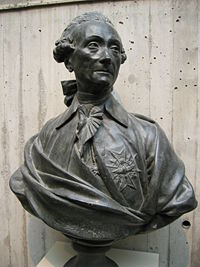
Louis-Jules Mancini-Mazarini, Duc de Nivernais
Encyclopedia

Diplomat
A diplomat is a person appointed by a state to conduct diplomacy with another state or international organization. The main functions of diplomats revolve around the representation and protection of the interests and nationals of the sending state, as well as the promotion of information and...
and writer
Writer
A writer is a person who produces literature, such as novels, short stories, plays, screenplays, poetry, or other literary art. Skilled writers are able to use language to portray ideas and images....
. He was the sixth member elected to occupy seat 4 of the Académie française
Académie française
L'Académie française , also called the French Academy, is the pre-eminent French learned body on matters pertaining to the French language. The Académie was officially established in 1635 by Cardinal Richelieu, the chief minister to King Louis XIII. Suppressed in 1793 during the French Revolution,...
in 1742.
Biography
Mancini-Mazarini was born in ParisParis
Paris is the capital and largest city in France, situated on the river Seine, in northern France, at the heart of the Île-de-France region...
, son of Philippe Jules François Mancini, duc de Nevers from 1707 to his death, and Maria Anna Spinola, who had married in 1709. Philippe Jules François was a great-nephew of Cardinal Mazarin. He was a great grandson of the great beauty Gabrièlle de Rochechouart de Mortemart
Gabrielle de Rochechouart de Mortemart
Gabrielle de Rochechouart de Mortemart, Marchioness of Thianges was a French noblewoman. A great beauty and wit, she was the older sister of Françoise de Rochechouart de Mortemart, Madame de Montespan.-Biography:...
, sister of Madame de Montespan.
Mancini-Mazarini was educated at the Collège Louis le Grand, and married at the age of fourteen. He served in the campaigns in Italy
Italy
Italy , officially the Italian Republic languages]] under the European Charter for Regional or Minority Languages. In each of these, Italy's official name is as follows:;;;;;;;;), is a unitary parliamentary republic in South-Central Europe. To the north it borders France, Switzerland, Austria and...
(1733) and Bohemia
Bohemia
Bohemia is a historical region in central Europe, occupying the western two-thirds of the traditional Czech Lands. It is located in the contemporary Czech Republic with its capital in Prague...
(1740), but had to give up soldiering on account of his weak health. He was subsequently ambassador at Rome
Rome
Rome is the capital of Italy and the country's largest and most populated city and comune, with over 2.7 million residents in . The city is located in the central-western portion of the Italian Peninsula, on the Tiber River within the Lazio region of Italy.Rome's history spans two and a half...
(1748–1752), Berlin
Berlin
Berlin is the capital city of Germany and is one of the 16 states of Germany. With a population of 3.45 million people, Berlin is Germany's largest city. It is the second most populous city proper and the seventh most populous urban area in the European Union...
(1755–1756) and London, where he negotiated the treaty of Paris
Treaty of Paris (1763)
The Treaty of Paris, often called the Peace of Paris, or the Treaty of 1763, was signed on 10 February 1763, by the kingdoms of Great Britain, France and Spain, with Portugal in agreement. It ended the French and Indian War/Seven Years' War...
(10 February 1763). From 1787 to 1789 he was a member of the Council of State. He did not emigrate during the Revolution
French Revolution
The French Revolution , sometimes distinguished as the 'Great French Revolution' , was a period of radical social and political upheaval in France and Europe. The absolute monarchy that had ruled France for centuries collapsed in three years...
, but lost all his money and was imprisoned in 1793. He recovered his liberty after the fall of Robespierre, and died in Paris on the 25th of February 1798.
In 1743 Mancini-Mazarini was elected to the Académie Française
Académie française
L'Académie française , also called the French Academy, is the pre-eminent French learned body on matters pertaining to the French language. The Académie was officially established in 1635 by Cardinal Richelieu, the chief minister to King Louis XIII. Suppressed in 1793 during the French Revolution,...
for a poem entitled Délie, and from 1763 he devoted the greater part of his time to the administration of the duchy of Nevers and to belles-lettres. He wrote much and with great facility; but his writings are generally considered to be of little value, his Fables being his best productions. His Œuvres complètes were published in Paris in 1796; an edition of his Œuvres posthumes was brought out in Paris by Nicolas-Louis François de Neufchâteau in 1807, and his Correspondance secrète was published in Paris by de Lescure in 1866.
Family
His wife was Hélène Françoise Angélique Phélypeaux de Pontchartrain (1715-1781), daughter of Jérôme Phélypeaux de Pontchartrain, who gave him 5 children;- X Mancini Mazarini (1737)
- Hélène Julie Rosalie Mancini Mazarini (1740-1780), married in 1753 to Louis-Marie Foucquet de Belle-Isle, comte de Gisors (1732–1758), son of the duc de Belle-Isle; married again to Louis-Camille de Lorraine, comte de Marsan, brother of the Duchess of BouillonLouise de LorraineLouise of Lorraine was a French noblewoman and member of the House of Lorraine. She married into the House of La Tour d'Auvergne and was Duchess of Bouillon.-Biography:...
; - Adélaïde Diane Hortense Délie Mancini Mazarini (1742-1808), married Louis Hercule de Cossé, Duke of Brissac;
- Jules Frédéric Mancini, Count of Nevers (1745-1753), died in infancy;
- Louis Mancini (1748-1748), died in infancy;

